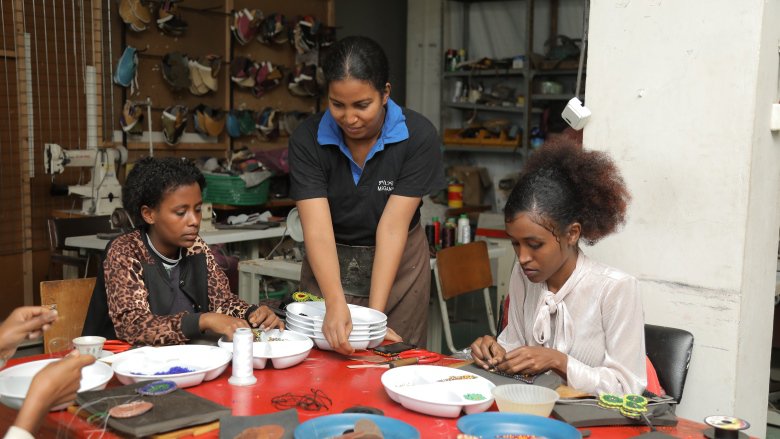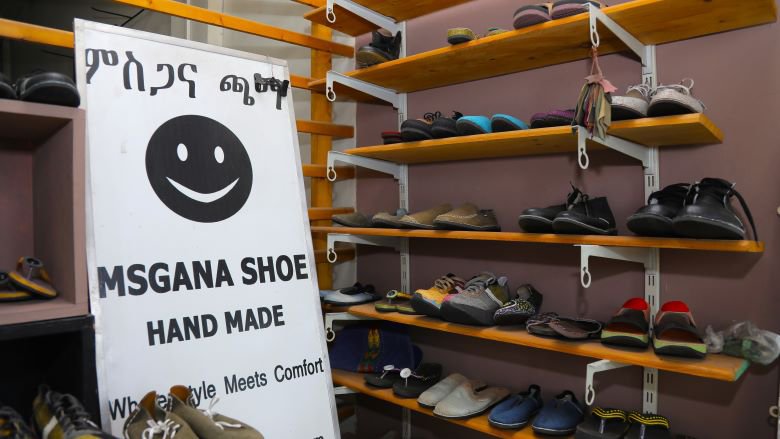With a penchant for environmental consciousness, Misgana Gebre Egziabhair skillfully crafts sustainable footwear using recyclable materials such as repurposed automobile tires and reclaimed denim. Her innovative recycling efforts not only help divert waste from landfills but also contribute to reducing CO2 emissions arising from incinerated waste. In 2014, Misgana and her siblings embarked on this entrepreneurial journey, starting the unique shoemaking venture, Msgana Shoes, with a modest capital of 2,000 Birr ($100). In the intervening years, with thanks to business training and accessible financing, Misgana's business has flourished?she��s expanded her workforce to over 25 employees and significantly increased her capital to 1.5 million Birr ($27,000).
Today, Misgana's eco-conscious shoes have gained international recognition, especially in Japan. Grateful for the nurturing support of the (WEDP), Misgana credits the organization's business development services and credit facilities for her thriving enterprise. She is one of the 48,000 project clients who benefited from WEDP loans and/or business development training and services.
WEDP, a $250 million initiative, is financed by the World Bank, the European Investment Bank, Canada, Italy, Japan, and the United Kingdom. It aims to address the 'missing middle' trap �C a phenomenon that occurs when small enterprises are too small for banks and too big for microfinance institutions. When businesses find themselves in this situation, unable to access loans from commercial banks or microfinance institutions (due to high minimum loan sizes and excessive collateral requirements), it is nearly impossible to expand and grow their businesses.
WEDP is targeting the ��missing middle��, filling a substantial market gap. Project data shows that 66% of WEDP borrowers had never accessed formal finance. For repeat borrowers, the average WEDP loan was 870% larger than their previous loan, showing the need and the success of this effort. At the same time, WEDP��s portfolio quality across the 15 participating financial institutions has been very good, with a PAR90 (portfolio in arrears) of only 3.1% as of May 2023, well below the 5% industry benchmark.
Financing institutions that are participating in this initiative show they have clean records of repaying WEDP funds provided by the Development Bank of Ethiopia fully and on time. Just as importantly, the WEDP line of credit has been successful in crowding in private capital over time, with participating institutions now mobilizing their own financing to issue loans to WEDP clients.
WEDP has also pioneered innovative financing approaches introducing new credit technologies to lenders, such as psychometric tests. These tests can predict the ability of a borrower to repay a loan and reduce the need for collateral. New lending methods such as repeat loan automation, cash flow-based lending, and revenue-based lending are also being introduced.
Misgana took out two loans from the WEDP credit facility�C $2,000 and $3,800�Crepaying both on time, helping her build a solid credit history, which then helped her secure a much larger loan of $24,000 from the Youth Revolving Fund (a parallel credit line from a WEDP participating financial institutions).
WEDP also provides comprehensive business training for women across 18 Ethiopian cities, and as of June 2023, 32,000 have completed these invaluable trainings. WEDP has pioneered innovative approaches to financing and training, focused on enhancing sustainability and fostering growth. A Gender Innovation Lab study revealed that entrepreneurs using psychometric assessments for loans during the COVID-19 pandemic's onset had higher business survival and profitability rates. This method is now being expanded to more financial institutions.
WEDP is one of the few programs of its kind in the world. Its innovative and effective model has been widely recognized for its success in empowering women and promoting gender equality in entrepreneurship. According to impact evaluation data, average WEDP client income has swelled by 67%, with firm employee numbers increasing by 58%, compared to a control group.


